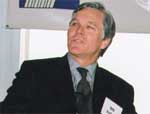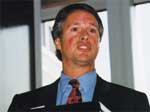Winter 2001
Roadmap 2005: National vs. Regional Strategies for the Future
Pew Luncheon Symposium:
Thursday, October 26, 2000
Journalism is no longer monolithic. While all journalists share core values, they no longer share identical goals for their news organizations. And regional news organizations now have very different strategies from national news organizations. About 150 epople heard these three top news executives describe their aspirations for the future.
Bill Keller
Managing Editor
The New York Times:

…Another thing that’s happened is that content has begun to gain more respect. There’s a growing realization out there that an awesome distribution network is only valuable if you have something of value to distribute.
Are we a time-sensitive breaking news organization? Or are we producers of thoughtful in-depth stories? Well, we’re both and we have to be both. To do things in-depth you need people covering the day-to-day stuff, following the flow of events. So we’ve invested in more reporters on the ground in more places, and we’ve invested in the kind of time consuming, labor intensive projects that most papers can’t afford to do.
The fragmentation of the news audience, the proliferation of niches that I talked about, has a potentially scary side. Maybe this is a romantic notion, but I think there are other things that humans want from their content providers besides a periodic delivery of news about the subjects that already interest them.
I think they want to plug into a social experience, to look in on what the neighbors are up to. I think they want to plug into a civic experience to get a sense of what’s important for them to know about the world and their own country. I think they want some serendipity, some novelty, and some surprise.
And I think that ability to define communities across lines of interest and ideology is the best reason to believe that newspapers, however the words are actually delivered, will survive.
Ann Marie Lipinski
Vice President and Executive Editor
The Chicago Tribune:

…My bosses and the gurus on Wall Street can and have made the business case for what is glibly known as synergy, but let me make the journalist’s case. Finding things out and telling people what we know is the essence of what we do.
McCormick understood this and, like him, newsrooms need to seek new ways to tell their stories, both within their news pages and beyond, in ways that deepen and do not compromise our social purpose.
Great newspapers will thrive not by imitating other great newspapers but by speaking in a cadence unique to their readers and unique to their markets.
There are certain core values that all great journalistic enterprises must embrace: honesty, fairness, accuracy. And those are not geographically bound. But there are many ways to achieve journalistic excellence and few of them have anything to do with parroting the other guy.
The next great newspaper will need to personify itself as the number-one citizen in the community, the one who beats up the bully, who cries at the tragedies, who provides the big ideas to create economic development, who is the school teacher/ tutor for children when their schools fail them.
In that sense, it does become the leading citizen of a community, no matter how small or how large that community is.
Gary Pruitt
President and Chief Executive Officer
The McClatchy Company:

…Mass media status not only serves a business purpose but an important public service aspect of bringing cohesion to a community, that otherwise might not have a common basis for civil discourse or community action because there’s no other institution that has that same reach to provide that basis in each local market.
We need to take advantage of people’s desire to communicate and connect to one another. As newspaper companies, we were never able to do that in the past. Talk radio did it, kind of people pooling their ignorance. But what we hope to do is that we can have forums and live interviews and chatrooms and elevate the level of debate both on the Internet site driving to the paper and back.
But I don’t think newspapers’ future is sort of mundane and utilitarian. Because at the same time we’re guiding and directing, I think newspapers are going to have to provide increasingly sophisticated journalism to set us apart from the ubiquitous commodity headline stories that are everywhere.
This places a premium on reporters and editors knowing what to focus on and how to get beneath the obvious and how to tell stories compellingly as Ann Marie referred to.
I do think it’s a great time to be a journalist. Journalists are the purveyors of meaning and content and context amidst all the noise out there. That ability that journalists have will be more valuable, more essential in the future than ever.
Our society needs the help of journalists, not exclusively, but the help of journalists to lead us from the Information Age to what we hope will become the Knowledge Age and we’ll all be better off then.
Read the entire Roadmap 2005 Transcript >>>
